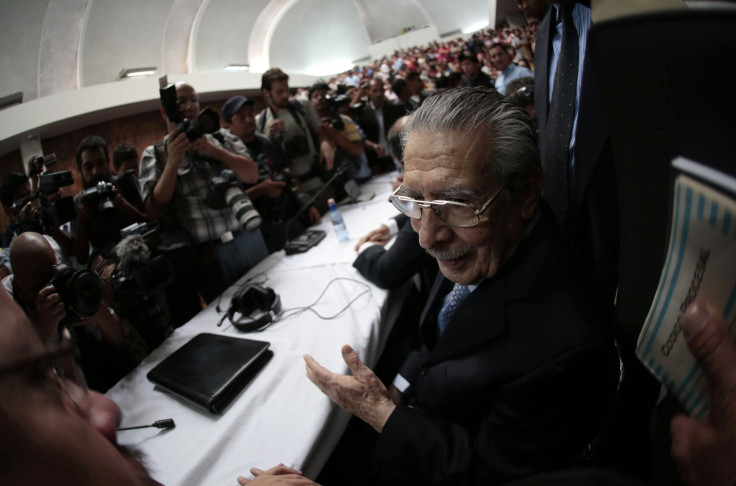
Human rights advocates condemned the annulment of a Guatemalan court's decision that had found ex-dictator Efraín Ríos Montt guilty of genocide and sentenced the 86-year-old former general and congressman to 80 years in prison. All proceedings occurring after April 19 were declared void in a 3-2 decision by the Guatemalan Constitutional Court.
The San Francisco-based Center for Justice and Accountability issued a statement to the Latin Times from Almudena Bernabeu, its leading counsel on the genocide case in Spain.
"It seems that reversing a sentence on such flimsy and formalistic grounds could only be the product of political maneuvers and pressure," the statement read. "This resolution echoes the demands of the private and business sectors of the Guatemalan society (i.e. CACIF). In a democracy, this is very dangerous attempt to manipulate and interfere with the judicial system."
RELATED:
Ríos Montt Conviction Overturned
Former Soldier Says Guatemala President Involved In War Crimes
Rios Montt Hospitalized After Fainting
Amnesty International's researcher on Guatemala, Sebastian Elgueta, said in a press release from the organization that the ruling was a "devastating blow for the victims of the serious human rights violations committed during the conflict" and called the legal basis for the ruling "unclear".
"It is uncertain how the trial court can hit the reset button to get back to a point in mid-April. What is clear is that the Constitutional Court has just thrown up formidable obstacles to justice and accountability for a harrowing period in Guatemala's recent history," Elgueta said. "With the sentence on 10 May, the trial court had sent a strong signal that crimes against thousands of Mayan victims would not be tolerated. The Constitutional Court has now questioned that message, putting the right to truth, justice and reparation at risk in Guatemala."
Ríos Montt is now once again facing charges for the massacre of 1,771 residents of Ixil Mayan villages, enforced displacement of 29,000, sexual abuse against eight women and torture of at least 14.
What will happen when the case returns to trial remains to be seen. Among the proceedings to be declared void are the prosecution's closing arguments. According to a project by the Open Society Justice Initiative, which recorded and summarized the court proceedings, the prosecution outlined military plans, strategies and command structures in addition to giving concrete details about massacres, forced displacement, burning of homes, crop destruction and rape of women by soldiers.
The closing arguments also detailed two military strategies used during the ex-general's tenure as head of state, known as Plan Victoria and Plan Sofia.
Plan Victoria analyzed the state of insurgent forces in Guatemala, which it said "tends to involve the large majority of the indigenous population in the area" and outlined a strategy to destroy insurgent bases through annihilation and scorched earth tactics. Plan Sofia contains details of counterinsurgency operations carried out in a part of Guatemala which includes the Ixil villages -- also during Ríos Montt's reign -- and in delineating the structure of military communications purports to show, according to prosecutor Orlando Lopez, that Ríos Montt "was involved in all that was happening in the Ixil area."
Another piece of evidence that was thrown out was a video of the ex-general saying, "We have a problem-we are an amalgam of nations with their own languages and customs" and indicating he intended to create a single integrated Guatemalan national identity.
Twitter users today were expressing their opinions on the trial at the hashtags #sihubogenocidio ("yes, there was genocide") and #nohubogenocidio ("no, there wasn't genocide").
© 2025 Latin Times. All rights reserved. Do not reproduce without permission.




